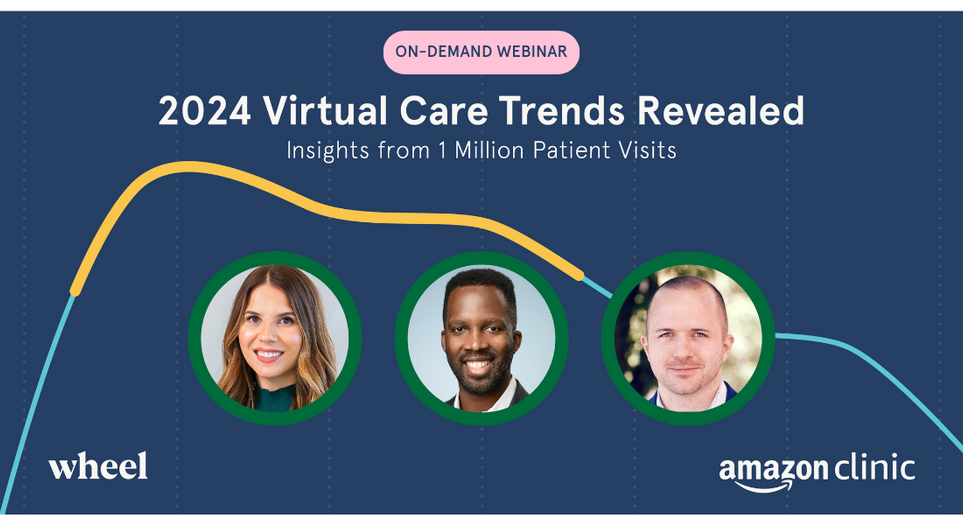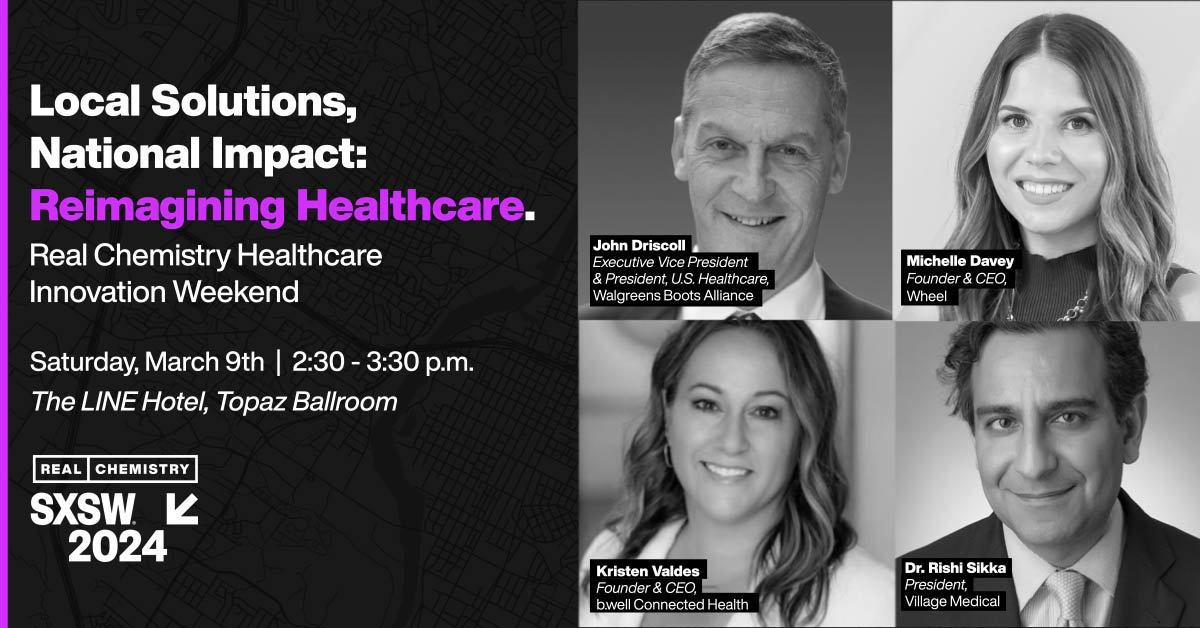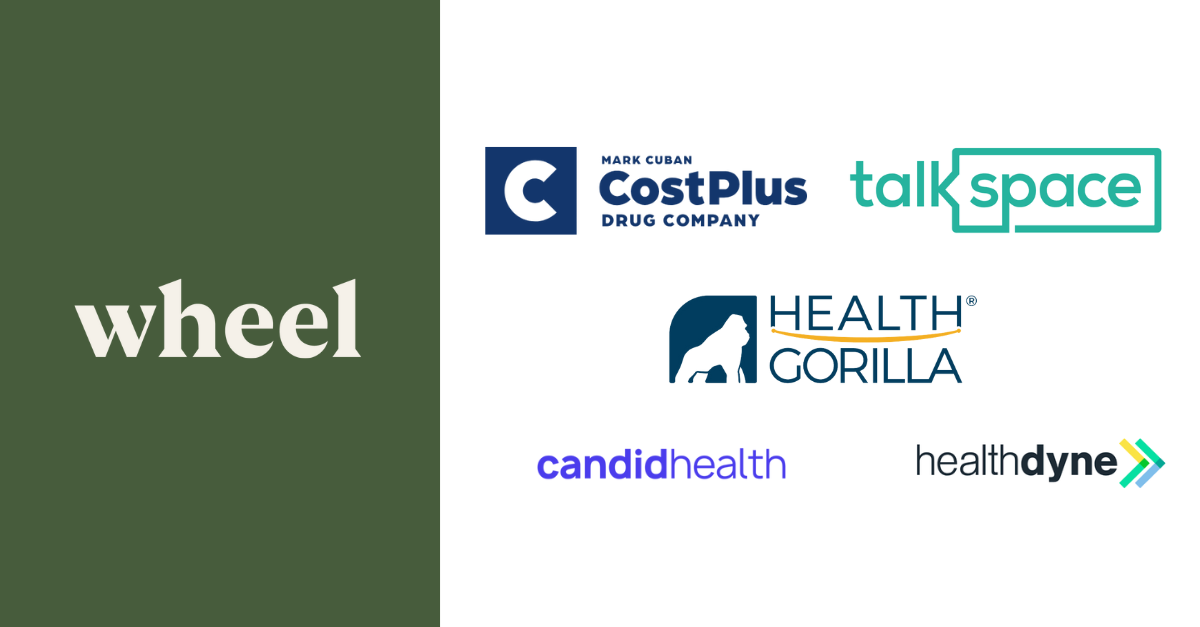Telehealth News Recap - Mar 2024

Keeping up with the latest news in the virtual care space is challenging. Wheel's Virtual Care News is a monthly newsletter for stakeholders in the digital health industry. As a subscriber, you'll receive timely information on trending news, regulatory updates, engaging conversations, and key innovations emerging in the space
Subscribe here 🗞
Explore the latest virtual care trends, insights, and innovations in Wheel’s March Virtual Care News roundup.
As always, we've got you covered with the latest scoop in payer, retailer, provider, and health tech news. Here are the highlights:
- 📽️ Available on-demand: 2024 Virtual Care Trends Webinar with Amazon Clinic
- 💻 What is virtual first care?
- 9️⃣ Nine key industry announcements from ViVE 2024
Read time: 9 minutes
Power the future of virtual care with Wheel. Book a demo.
🛞 Wheel News
On-Demand Webinar: Virtual Care Trends from Wheel and Amazon Clinic

ICYMI: Wheel partnered with Amazon Clinic to host our first webinar of the year, “2024 Virtual Care Trends Revealed.” If you missed the event or want to rewatch the insightful panel discussion, you can now access the 45-minute webinar recording at your convenience.
During the webinar, our expert panelists, Wheel's CEO Michelle Davey, Physician Executive Dr. Greg McDavitt, and Dr. Nworah Ayogu, Chief Medical Officer and GM at Amazon Clinic, discussed the future of virtual care. They shared their bold predictions, data-backed insights, and strategic recommendations for virtual care innovation in 2024.
SXSW 2024: Local Solutions, National Impact: Reimagining Healthcare

Are you heading to Austin for SXSW? Don’t miss “Local Solutions, National Impact: Reimagining Healthcare,” a panel featuring our CEO Michelle Davey, John Driscoll from Walgreens Boots Alliance, Kristen Valdes from b.well Connected Health, and Dr. Rishi Sikka, M.D. from VillageMD.
Join us for an insightful discussion on how AI and other health technologies can be integrated into community frameworks to address patient access challenges. Learn how these technologies can revolutionize patient experiences and help provide comprehensive healthcare services at scale.
Wheel Adds High-Impact Partners to Integrated Ecosystem

We're excited to announce the addition of five new partners to our Integrated Virtual Care Ecosystem: The Mark Cuban Cost Plus Drug Company, Talkspace, Health Gorilla, Candid Health, and Health Dyne. With these additions to the Wheel ecosystem, Wheel customers can easily connect patients with high-quality mental health services, provide transparent, affordable home delivery pharmacy options to patients, deliver seamless lab and diagnostic services, and more.
We're confident these new partners will help simplify and streamline care access for patients within a single destination while enabling our customers to deliver more comprehensive, integrated services. To learn more about our partner ecosystem, contact your account manager.
Fierce Healthcare >
📊Trends & Insights
What Does Virtual First Mean in Healthcare?
Virtual First Care, sometimes shortened to V1C, has been a trending concept in the healthcare space for years now. The term is deceivingly self-explanatory, but what does it really mean? How is V1C related to telehealth, virtual care, and hybrid care?
In this article, the Medical Futurist breaks it down:
- “Virtual first healthcare refers to prioritizing remote or virtual access to medical services before in-person visits, leveraging digital tools for initial consultations.
- Though related to telehealth and virtual visits, virtual first represents a distinct hybrid model that emphasizes optimizing care delivery by using both virtual and physical resources.
- While virtual first healthcare presents accessibility and cost-saving benefits, its adoption faces challenges, including potential disparities in care access for different population groups.”
From Buzzword to Business Case: Constructing AI Use Cases for Pharma
AI is generating a ton of hype, promising greater efficiency across the healthcare industry, particularly in pharma. Amid all the headlines and shiny new tools, it can be difficult for executives to identify the best AI use case for their organizations.
This is why Rock Health developed this two-phase approach that leaders can follow to move their AI use cases from “buzz to a plan.” This guide will help healthcare leaders (in pharma and beyond) construct a solid use case for various AI solutions and evaluate the potential impact those solutions will have on your business. Check out the full report to learn more.
Rock Health >
🤔 First Opinions & Engaging Conversations
How to Make After-Hours Primary Care Better for Doctors — and Patients
Whether you’re an on-call primary care doctor taking a call in the middle of a weekend lunch or a concerned patient waiting hours to talk to a doctor and avoid a trip to the ER, the traditional after-hours on-call primary care model can be problematic for everyone involved.
Patients deserve personalized, high-quality after-hours care for emergencies, and doctors deserve work-life balance. The standard on-call primary care model does not provide either. In this article, primary care physicians Dr. Jeffery Millstein and Dr. Jeffrey Tokazewski propose a virtual care alternative.
They argue that after-hours care “should not be an afterthought but rather a seamless extension of the same high-quality healthcare they receive during regular office hours.”
Stat News >
Tools for Better Data Interoperability Are Here — But Providers Aren’t Adopting Them
Despite the availability of numerous tools and data-sharing standards promoting improved healthcare interoperability, providers are struggling with adoption.
For instance, despite the widespread availability of electronic alternatives, 98% of provider referrals still rely on fax. Even with established standards like FHIR and DICOM, completing electronic referrals across systems can require multiple log-ins, complex patient look-ups, and inconsistent data.
Healthcare leaders shouldn’t assume that providers are using interoperability tools simply because they are available. When going digital presents so many barriers to entry, people will stick with what they know.
To enhance adoption, healthcare organizations must invest in targeted education programs, offer transparent communication regarding each tool's benefits, address workflow integration challenges, and incorporate provider feedback to foster a supportive environment for embracing new technologies in healthcare.
MedCity News >
⚖️ Policy & Regulatory Updates
Artificial Intelligence is Making Critical Health Care Decisions. The Sheriff is MIA.
The use of AI in healthcare is becoming more widespread, but regulatory oversight is struggling to keep up, leading to challenges in ensuring safety and effectiveness. Healthcare professionals are already using unregulated AI tools such as virtual assistants for note-taking and diagnostic software. However, regulatory bodies like the FDA are facing difficulties in keeping up with the rapidly evolving technology due to funding and staffing obstacles.
Unlike traditional medical devices or drugs, AI software is dynamic and requires continuous monitoring, a paradigm shift for the FDA. President Biden has pledged to respond swiftly to AI safety concerns, but resource limitations make proactive regulation difficult. A report from the Government Accountability Office amplifies calls for expanded FDA authority, especially regarding AI performance data and algorithmic guardrails.
Amidst congressional hesitancy to grant such powers, a proposal for public-private assurance labs to independently validate and monitor AI in healthcare is being considered. However, concerns arise about potential conflicts of interest in such collaborations, leaving the healthcare industry in a delicate balance between innovation and regulatory safeguards.
Politico >
✨ Growth & Innovation
9 ViVE Announcements You Don’t Want to Miss
ViVE 2024, a premier event for digital health companies, happened last week in Los Angeles. Here are nine key announcements made at this year’s show:
- Vale Health, a wellness marketplace platform company backed by a consortium of 16 leading healthcare systems, was introduced.
- EHR company Veradigm (formerly known as Allscripts) announced plans to acquire ScienceIO in a $140 million deal.
- Highmark Health, Epic, and Google Cloud announced a collaboration to improve coordination between payers and providers.
- GE HealthCare enters the at-home monitoring space with Biofourmis, a company that provides remote patient monitoring technology and digital therapeutics.
- Quantum Health, a healthcare navigation company, announced an industry-first partnership with Vanderbilt Health Affiliated network.
- Humana partners with Veda to make provider directories more accurate.
- Simple HealthKit, a diagnostics company, launched a new testing program for kidney disease.
- Virtual healthcare provider Omada Health is expanding its Insights Lab to study the effect of behavior change and GLP-1s on weight loss.
- Included Health released positive outcomes from its patient outreach pilot program, based on CDC’s Healthy Days measure.
Industry Roundup
Funding updates and innovative collaborations from the last month.
- Abridge secures $150M series C funding to invest further in generative AI for medical documentation
- Oula banks $28M series B funding to build out maternity care clinics and offer more services
- Cardiometabolic health startup 9amHealth scores $9.5M in a series A extension round
- b.well Connected Health raises $40M series C funding to scale platform unifying patient data